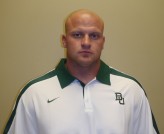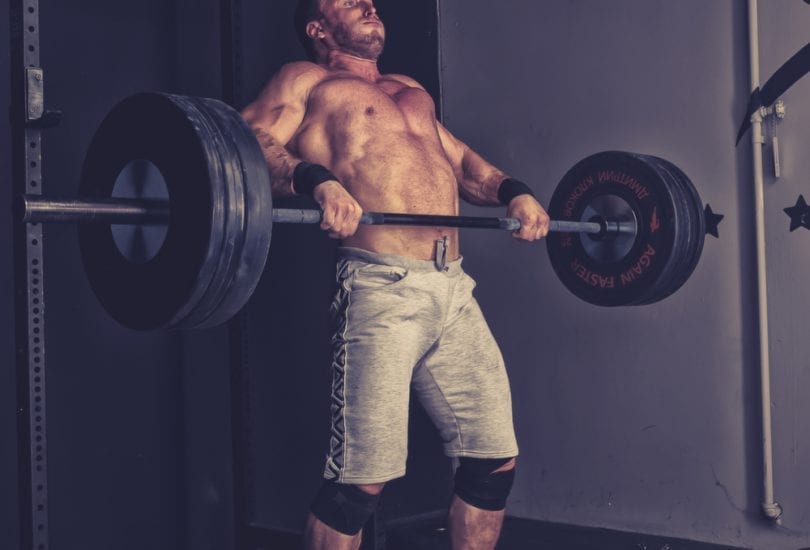Written by Team Juggernaut
Welcome to our new series “5 Questions with Coach…” where we will do short Q&As with some of the top coaches in the World. Top coaches in strength & conditioning, track & field, football, strength sports and more will be featured
Keith Caton is the Assistant Director of Athletic Performance at Baylor University. A collegiate strength and conditioning coach for over 13 years, Keith has coached in the Big 12 and the SEC. He has a Bachelor’s Degree in Exercise Physiology, Masters in Coaching / Sports Administration, and an EDS Degree. Keith is a competitive powerlifter, totaling over 2000lbs four times in multiply with an elite status and is currently competing in the raw 242s. To contact Keith by email: [email protected].
1. Describe your evaluation process for athletes incoming to your program?
We like to use a very holistic approach to the evaluation process on all of our athletes. A lot of schools are moving towards a High Performance Department in which conditioning, lifting, recovery, nutrition, FMS, vision training, etc. are all linked together. Here at Baylor we have incorporated a model like this for the last five years. We will look at the physicals performed by our doctors, FMS scores, Omegawave data, heart rate monitors, and we are transitioning into adding data from the Catapult GPS system. The athletes will even perform peripheral vision training on the Dynavision D2 Boards and use the CogniSens Neuro Tracker to improve cognitive response and to look at recovery from concussions. Our incoming athletes begin in our White group and will warm-up in the morning and condition with the team. Our dynamic warm-up usually takes about 20 minutes and you can learn a lot about movement and deficiencies from this alone. They will then perform more of a standardized conditioning program for the first few weeks: 110s, crossfields, and tempo runs. We then bring them back in the afternoon to lift at a separate time to give us the opportunity to slow things down and teach them our system. The freshmen will then perform basic compound movements and loads will be linear. Some of the most common deficiencies and concerns are: re-teaching technique dealing with squat, clean, bench and pulls, posterior shoulder girdle strength and posture, posterior chain strength, stiffness in the thoracic area, and poor handling of their body weight (we perform a lot of body weight push-ups, squats, pull-ups, and core work within the warm-up and the lift to counter for this).
2. Baylor is a team known for their speed, what are you doing to develop that?
Coach Briles and his staff do a great job of recruiting great kids with great speed. It makes it a lot easier. As Coach Kaz, our Assistant Athletic Director of Athletic Performance, likes to say, “The person you are will determine the athlete you will be.” We have a great group of athletes so it makes coaching easy. Besides that, we make sure our guys are actually running full speed with full recovery. You can’t make an athlete faster by running 40 x 40 yard sprints, especially without the right recovery. Our Director of Football Athletic Performance, Coach Ruf, is very smart with speed work and he really has a passion for it. We make sure that our guys look great during the speed/dynamic movements and really adjust the plyos and starts / running form of our guys. We also will do a lot of dynamic work in the weight room working on moving the weight on the bar as fast as possible. Plus, it is one of our things we hang our hat on, “EAT BREAKFAST, SQUAT HEAVY AND RUN FAST!!”

3. Nutrition is always a challenge with high school and college athletes, what are some practical steps that can be taken to help them?
Our Director of Sports Nutrition, Anne Hogan, does a great job of breaking everything down to the athletes. Her main thing is to find one thing that can make you better which in turn will help the team. Drink one more bottle of water, add one more vegetable to your omelet, and eat one more piece of fruit. It is also nice to have all the Athletic Performance Coaches supporting her message with the athletes. We as a staff are always in their ears making sure they are on top of their nutrition. We also put a huge importance on the recovery aspects of training. As you know you break the muscle down by training so it has to get recovered for you to become better. We communicate the importance of modalities such as foam rolling, yoga, massage, sleep, sleep, sleep, and sleep to our athletes.
4. Energy system work is so often mismanaged by coaches; describe to us Baylor’s off season and in season philosophy on energy system training?
First off, Coach Briles runs great practices in-season allowing us to spend post practice on recovery instead of conditioning. In the off-season we make sure that we are staying away from the glycolytic system as much as possible. We will try to really build the aerobic system, especially at the beginning of a training cycle, and then build in more alactic work as the off-season starts to become pre-season. Coach Althoff, our Associate Director, is very knowledgeable with the energy systems and is constantly adjusting our energy system training year by year to best help our athletes compete at the highest level. That also allows them to be fast, play after play.
5. Baylor received the distinction, “Team of Freaks” by CBS Sports this year, what are some of the most impressive feats you’ve witnessed from your athletes?
One of the most amazing things I have seen is 340lb lineman, such as Cyril Richardson, doing full pull-ups. That is such a hard task for big men but they make it look easy. We have really strong guys (squatting 600 or more), we have really explosive guys (multiple receivers and defensive backs jumping 40inch verticals), and we have really fast guys(a lot of skill in the 4.3s and our starting linebacker core in the 4.4s) but the freakish stuff comes on Saturday. The athletes come to college to play football, not lift. That is where all the really freaky stuff happens, when guys out run or run through guys. That is the stuff that matters, the really FUN STUFF!!!







































